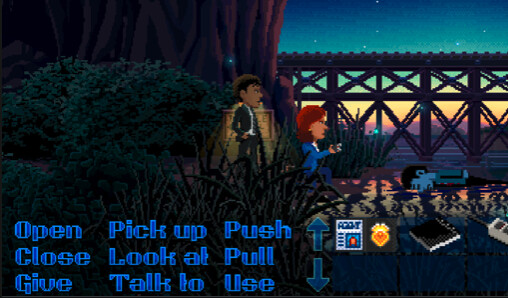I feel like it’s the difference between a crossword puzzle and a word search. A crossword puzzle has the possibility of all words in the dictionary, although some appear way more than others (like ‘ere’), but a word search has all words visible at all times. So I feel like having the list of verbs in game (which I’ve done many times) is like having a word search I think.
What I mostly expect:
- GO [DIRECTION] (or N, S, E, W, NE, SW, etc)
- LOOK
- EXAMINE [SOMETHING]/LOOK AT [SOMETHING]/READ [SOMETHING]
- INVENTORY
- TAKE/GET [SOMETHING]
- DROP/THROW [SOMETHING]
- OPEN/CLOSE (doors and containers]
- UNLOCK/LOCK (doors and containers) [with SOMETHING]
- PUT ON/TAKE OFF [WEARABLE THING]
- INSERT [SOMETHING] INTO [SOMETHING]
- PUT [SOMETHING] ON [SOMETHING]
- PUSH/PULL [SOMETHING]
- GET ON/GET OFF (supporters)
- TALK TO [SOMEONE]
I think that kind of covers 90% of what you do in most parser games, barring special verbs and interactions. There can be GIVE/SHOW [SOMETHING] and all variations of ASK/TELL optionally in certain games that include NPCs. ATTACK/BREAK might also be used in certain situations.
The SCUMM interface as refined in Thimbleweed Park is this:

USE gets the most mileage - USE KEY WITH DOOR subs for unlock, USE IDOL WITH PEDESTAL works for putting something on a supporter, USE PUZZLE PIECE WITH PUZZLE for inserting, USE GORILLA COSTUME to wear it, etc. GIVE works as it should but also doubles as SHOW [SOMETHING] TO [SOMEONE]/ASK ABOUT [SOMETHING] - the game won’t let you give away important objects or drop them.
The advantage is the game is designed around nine verbs and you can only refer to nouns in the graphical window or in inventory, so there is no guess-the-verb/noun and scope is handled visibly.
You might add WAIT, CLIMB, and TURN ON/OFF to that list. I hadn’t been counting INVENTORY (or other UI actions like saving games). I did count on/off pairs as two, but all compass directions as one.
USE is of course totally cheating. Most action games get away with having only that verb, and make it implicitly activated by bumping into things. When you boil it down, the verbs aren’t about being necessary, they’re about affirming to the game that you’ve thought up the solution and know what the effect of USE is going to be.
I’m not sure yet how I quote a post using a screen reader, but I also expect the game will use the ones that Hanon mentioned. I end up trying ‘search’ as well because you never know, although I’m glad that it seems to have fallen out of favour these days.
The ones that throw me are when it wants you to use something like ‘reach’, because reasons. I’ll be there trying take/get, trying to push whatever it is with something else, and when I look at the walkthrough apparently I just had to ‘reach’ it. I can’t remember which game it was now.
On the topic of “typical verbs”, Jason Dyer of the All the Adventures blog keeps referring to a list he keeps of likely verbs to try. I guess this is one iteration of it (transcribed from a screenshot). 127 words, it looks like. A few oddballs in there.
cut put kick gaze pan
dig push shoot tell trade
climb pull wear switch float
swim touch talk duck stick
read turn saw crawl pluck
break move scrape fix suck
open ask tickle rotate
drink yell think invoke cross
eat sleep buy activate show
wait make cover reset punch
kill feel kiss swing
fill say knock lower
light clean listen adjust
rub wash stand tap roll
throw slide type foretell
hit cook smell pray kneel
unlock mix stab sing mend
lock lick hold dance
sit scare play parry fish
tie ride close abandon
untie search go pick
shake burn enter sniff embark
wave hire draw raise
pour use unlight thread launch
pay examine shout connect
smash insert fly follow
feed set fight
jump press inventory pick-up